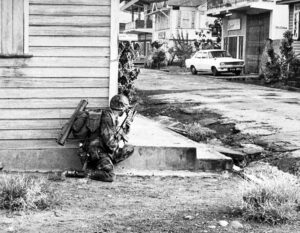‘Forgers’ of Niger Uranium Contract Named
Remember the uranium ore that Hussein supposedly purchased from Niger? A contract documenting the sale was used as evidence of the need to invade Iraq and was included in a 2002 U.S. State Department fact sheet on Iraq's weapons program. Remember how the IAEA denounced the documents as fakes shortly before the invasion of Iraq? Well, according to the Times Online, the forgers have finally been named.Remember the uranium ore that Hussein supposedly purchased from Niger? A contract documenting the sale was used as evidence of the need to invade Iraq and was included in a 2002 U.S. State Department fact sheet on Iraq’s weapons program. Remember how the IAEA denounced the documents as fakes shortly before the invasion of Iraq? Well, according to the Times Online, the forgers have finally been named.
Your support matters…The Sunday Times:
Two employees of the Niger embassy in Rome were responsible for the forgery of a notorious set of documents used to help justify the Iraq war, an official investigation has allegedly found.
According to Nato sources, the investigation has evidence that Niger’s consul and its ambassador’s personal assistant faked a contract to show Saddam Hussein had bought uranium ore from the impoverished west African country.
The documents, which emerged in 2002, were used in a US State Department fact sheet on Iraq’s weapons programme to build the case for war. They were denounced as forgeries by the International Atomic Energy Agency (IAEA) shortly before the 2003 invasion.
Independent journalism is under threat and overshadowed by heavily funded mainstream media.
You can help level the playing field. Become a member.
Your tax-deductible contribution keeps us digging beneath the headlines to give you thought-provoking, investigative reporting and analysis that unearths what's really happening- without compromise.
Give today to support our courageous, independent journalists.





You need to be a supporter to comment.
There are currently no responses to this article.
Be the first to respond.